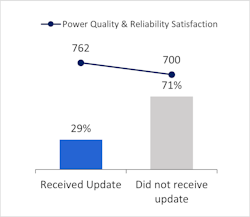As Customers Face Rate Hikes, Utilities Must Find Ways To Manage Growing Frustration
Electric utilities find themselves between a rock and a hard place. Business customers are paying more than ever for their electricity and, not surprisingly, they’re not happy about it. But when it comes to setting those rates, utilities are at the mercy of many external factors, ranging from the commodities market to local regulations to the weather. As business customers continue to express their dissatisfaction with the steps utilities are taking to support their needs, many utilities feel, pardon the pun, powerless to combat that customer sentiment.
According to the J.D. Power 2023 Electric Utility Business Customer Satisfaction Study, overall business customer satisfaction with electric utilities is 754 (on a 1,000-point scale), the lowest score in the past seven years. In addition to prices, dissatisfaction is being driven by a perceived lack of concern among business owners that their electric utilities are sensitive to their energy and financial needs.
Coupled with economic pressures, this high-rate environment presents an unnerving challenge, but utilities can take solace that there are steps they can take to mitigate some of this negative sentiment. By ramping up communications, delivering more personalized service and demonstrating their commitment to customers with reliable infrastructure, utilities can offset some frustration and build better relationships with their customers.
The Power of Being Proactive
Right now, far too many business customers are not receiving proactive outreach, including power outage updates or support for planning. They are largely unaware of infrastructure investments, tree trimming and other improvement projects, and they often have no dedicated service when they contact their utility. Utilities need to increase engagement and collaboration with these high-value customers, which can be achieved in part with personalization and proactive outreach.
Nearly three-fourths (71%) of business customers who experienced a power outage say their electric utility did not provide outage-related updates. However, among the 29% of customers who did receive an outage-related update, satisfaction is 62 points higher than among those who didn’t receive an update. Similarly, 42% of business customers say their typical contact method is the utility’s main telephone number. Just 15% of business customers say they have an assigned account representative and their satisfaction is 75 points higher.
Utilities also have an opportunity to help offset negative sentiment by raising expectations in terms of reliability and service. The percentage of business customers who say their electric utility does a good job maintaining infrastructure has declined 4 percentage points this year, while overall business customer satisfaction is down 20 points and power quality and reliability satisfaction is down 13 points (786 vs. 799 in 2022).
Neutralizing Price Complaints
While reliability and communication can move the needle, nothing quite has the same impact as pricing changes. That’s certainly the case in the 2023 data.
With customers paying more, overall business customer satisfaction with the price of electricity is predictably down 38 points this year. Fortunately, utilities do have the ability to neutralize this effect. The drop in satisfaction is much less severe when customers receive advance notice to prepare for rate increases, and the utility provides ways to reduce bills, such as budget billing options, financial assistance programs or rebates. For example, Georgia Power works with customers to find various energy solutions and highlights their many “success stories,” including cost savings, on their website.
Customers also were willing to tolerate these price hikes when utilities helped them innovate, particularly when the project bolsters their sustainability efforts. Nearly one in five (19%) businesses currently have an EV charging station at their business location and 60% of businesses say it is “somewhat important” or “very important” to have EV charging available at their business. Price satisfaction among businesses with EV chargers is 93 points higher than among those with no chargers installed.
Building Goodwill
The utility-customer relationship isn’t necessarily a choice, but it behooves everyone to have this dynamic be as productive as possible. The more satisfied customers are, the easier a time that utilities will have when they do have to step in and take customers offline for a scheduled shutdown or petition the local regulator for a price hike. The more proactive and engaged utilities are, the better chance they stand to build trust and make customers feel like partners in the process.
Adrian Chung is director of utilities intelligence at J.D. Power.
About the Author
Adrian Chung
Adrian Chung is director of utilities intelligence at J.D. Power. He is responsible for business development and the management of syndicated and custom projects, and provides clients with tactical and strategic support in improving customer satisfaction performance in order to drive retention and profitability. Since joining J.D. Power in 2004, he has helped clients address specific customer needs from a cross-industry perspective, based on his experience in working with automotive, financial services, insurance, real estate, and telecommunication client companies.

